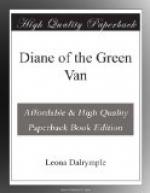But Diane was gone, stumbling headlong from the tent. Aunt Agatha was to remember her white agonized face for many a day.
CHAPTER XLVI
IN THE FOREST
With the darkening of the night a wind sprang up over the bleak, black expanse of lake and swept with a sigh through the forest on the shore. It was a wind from the east which drove a film of cloud across the stars and bore a hint of rain in its freshness. The rain itself pattering presently through the forest fell upon the huddled figure of a girl who lay face downward upon the ground among the trees.
She lay inert, her head pillowed upon her arm, face to face with the unspeakable shadow that had haunted Carl. Not married. Aunt Agatha had said, but just a mother! Now the pitiful fragments of a hallowed shrine lay mockingly at her feet. How scornfully she had flashed at Carl!
Diane quivered and lay very still, torn by the bitter irony of it.
And the Indian mother! Carl had known and Ronador. She had caught a startled look in the eyes of each at the Sherrill fete. Every wild instinct, if she had but heeded the warning, had pointed the way; the childhood escapade in the forest, the tomboy pranks of riding and running and swimming that had horrified Aunt Agatha to the point of tears, and later the persistent call of the open country.
What wonder if the soft, musical tongue of the Seminole had come lightly to her lips? What wonder if Indian instincts had driven her forth to the wild? What wonder if the nameless stir of atavism beneath a Seminole wigwam had frightened her into flight. Indian instincts, Indian grace, Indian stoicism and courage, Indian keenness and hearing—all of these had come to her from the Indian mother with the blood of white men in her veins.
But the stain of illegitimacy—
That brought the girl’s proud head down again with a strangled sob of grief. Shaking pitifully, she fell forward unconscious upon the ground.
Some one was calling. There was rain and a lantern.
Diane stirred.
“Diane! Diane!” called the voice of Philip.
At the memory of Philip and Arcadia, Diane choked and lay very still.
“Diane!” The lantern shone now in her face and Philip was kneeling beside her, his face whiter than her own.
“Great God!” said Philip and stared into her haunted eyes with infinite compassion.
But Philip, as he frequently said, was preeminently a “practician,” wherefore he gently covered the girl with his coat, busied himself with the lantern and, for various reasons, sought to create a general atmosphere of commonplace reality.
“Your aunt sent me,” he said at length. “She’s awfully upset.”
“She told you?”
“Yes.”
“Of—of the Indian mother?”
“I knew,” said Philip. “Carl told me. I withheld it this morning purposely. Why fuss about it, Diane? Lord Almighty!” added this exceedingly practical and democratic young man, “I shouldn’t worry myself if my grandfather was a salamander! . . . And, besides, your true Indian is an awfully good sport. He’s proud and fearless and inherently truthful—”




